#i like how they (gerard ray cavallo) describe the sound of the album
Explore tagged Tumblr posts
Text
What was happening in your personal life during the recording sessions for Danger Days? Gerard: Me and Lindsey [Way’s wife, artist Lindsey Ann Ballato] had a child; we went through this odyssey. We weren’t [being] fearless. I told her, “I haven’t made this special thing,” and she really encouraged me to realize that I was an artist. She said, “You’re an art kid, in a rock band, but you’re an artist; that is what you do. You were making a record like a guy in a rock band, and that is not you.” That signified the change, and I then got fearless. I wanted to make this crazy song with drums and nonsense digital sounds. I wanted it to be a poisonous album, I want it to contaminate things. I want the album to have this infiltration quality, this neurotoxin quality. All the noises, all the digital sounds, I wanted it to feel like a feel like a fun disease, like a drug. And it was my rebellion against 30-something rock culture. This rocks way harder; it captured the spirit of everything we wanted to do the first time but hadn’t achieved.
EQ, January 2011 (link)
455 notes
·
View notes
Text
“Conventional Weapons” and the Rocky Road to “Danger Days”
In 2009, My Chemical Romance was buzzing with activity. The band performed several shows and festivals (including Summer Sonic in Japan), Gerard and Mikey Way attended San Diego Comic Con, and The Umbrella Academy was named one of Amazon’s top comics of 2009. Ray Toro held a Whopper eating contest on the official MCR website (no joke), while a certain comic series written by Gerard Way and Shaun Simon was announced in August. And at a show at the Roxy in Los Angeles, MCR performed three new songs from their upcoming album.
But while their next album seemed easily slated for an early 2010 release, MCR was about to hit a series of hurdles that would leave them with a scrapped album, a lost drummer, and a totally new outlook on where their music was headed.

On July 31st, 2009, MCR performed a set at the Roxy that included three new songs–“Kiss The Ring,” “The Drugs,” and “Death Before Disco.” Gerard was enthusiastic about the new tracks, even telling Rolling Stone that “Death Before Disco” was “the greatest song we’ve ever written.” Videos of the tracks soon appeared online, where fans eagerly devoured what they thought would be the follow-up to 2006’s The Black Parade.

As the days and weeks went on, the media blitz kicked into high-gear. While Ray Toro posted short studio clips on MCR’s website, the band gave several interviews where they gushed about producer Brendan O'Brien, discussed their new stripped-down style, and claimed that this would be their best record yet. In an interview with MTV, Gerard described the still-untitled album as a “true love letter to rock and roll,” adding:
“There’s something about being an American rock-and-roll band that we’ve kind of grown into and we’re very proud of. And I think that’s what we’re celebrating with this record. There’s no agenda, there’s no mission; it’s just about rock and roll.”
Meanwhile, Gerard Way and close friend Shaun Simon had another surprise in store: a comic series called "Killjoys.” Dark Horse Comics announced the release at San Diego Comic Con. Jeremy Atkins, the Dark Horse Director of Public Relations, described “Killjoys” as “a psychedelic rock-and-roll road trip adventure geared toward both fans of The Umbrella Academy and My Chemical Romance.” But not much else was said about the comic, as MCR’s upcoming album had become Gerard’s top priority.
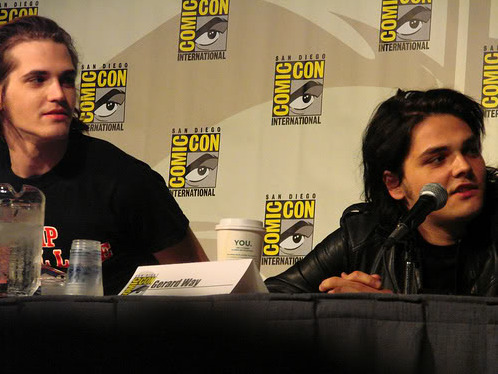
As the album drew closer to completion, MCR gave fans more glimpses of what lay in store. They shared the titles of various tracks, including “Still Alive,” “Trans Am,” “Hail To The King,” “Save Yourself, I’ll Hold Them Back," “L.A. Heavy,” "The Only Hope For Me Is You,” and ���Black Dragon Fighting Society.” They cited a variety of influences, including Queen, Judas Priest, Bruce Springsteen, The Killers, and Blade Runner. By all accounts, this was going to be MCR’s defining album.
In December, MCR previewed seven tracks for SPIN magazine. A month later, in January of 2010, the album–which was still untitled–was rumored to be released on March 30th. As they continued to rework the songs, they realized that the stripped-down sound wasn’t working. As NME reported in January:
Things turned around with a song called “Trans Am,” now renamed "Bullet Proof Heart,” the likely first single. And perversely, they did it by returning to fiction. Broadly, it’s about a boy in New Jersey, dressed in a Judas Priest T-shirt, called Johnny. And a girl called Jenny who might be his girlfriend, but who also (honk the pop fact sirens!) might also be the missing girl from “Jenny Was A Friend Of Mine” by The Killers.

But in the same interview, Gerard restated that the album would give "the purest, best version of the band you could ever hope for.” And in early February, MCR finally started to wrap up production, telling Big Cheese that the album would probably be released in spring or summer.
“Killjoys” also looked promising–back in January, Scott Allie had reported in a blog post that Shaun Simon and Becky Cloonan were ready to get started. Once Gerard wrapped up the album and finished working on the Umbrella Academy movie screenplay, it seemed like he’d be ready to dive in.
But February was also when the band publicly stumbled for the first time.

Before the Big Cheese interview, MCR had abruptly cancelled their appearance at the Soundwave festival in Australia. In a blog post on MCR’s website, Frank claimed that Gerard was having voice problems (he jokingly implied that it was due to coffee and cigarettes) and required treatment to make a full recovery.
Fans were disappointed, but most understood that it couldn’t be helped. But a month later, the fandom received another shock: MCR’s drummer Bob Bryar had departed the band. In another blog post, Frank told fans:
As of 4 weeks ago, My Chemical Romance and Bob Bryar parted ways. This was a painful decision for all of us to make and was not taken lightly. We wish him the best of luck in his future endeavors and expect you all to do the same. We also wanted to give you all a quick heads up on how the record is progressing. We have been writing some very powerful new songs so this week the four of us entered the studio once again, and what has been ending up on tape each night is some of the most exciting and honest work we have ever created.
The fandom was stunned. Clearly, MCR had been experiencing some behind-the-scenes turmoil, suggesting that the process wasn’t going as smoothly as fans had thought. While it wasn’t known at the time, they also parted ways with producer Brendan O'Brien, who had been hired specifically to channel their raw, back-to-basics sound. Where would MCR go from here? And when would fans hear the latest album–which was apparently undergoing rewrites once again?
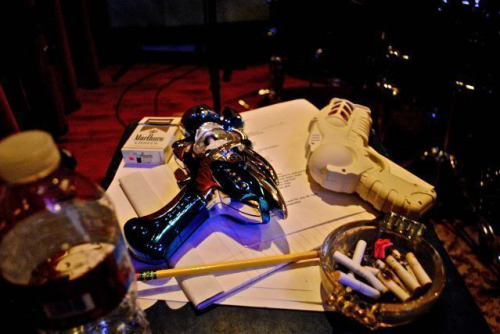
It wasn’t until late 2010 that fans would finally learn what had happened to this unreleased album.
This moment, says frontman Gerard Way, looking back on what went wrong, “was the hardest part”. Guitarist Ray Toro was “home dealing with some family things”, leaving Way, his bassist brother Mikey, and guitarist Frank Iero alone in the mixing studio. “The sinking feeling was really starting to become loud that it wasn’t right - that the record wasn’t finished, I couldn’t even put them in a track order … "Thinking about it now, it’s kind of upsetting, because I just felt so lost,” Gerard says.
This was discussed in an interview with Herald Sun, where they talked about the process of starting again after the departure of their drummer and producer. Speaking to Music Radar, Ray Toro talked about the struggles the band had with original producer Brendan O'Brien, admitting that it hadn’t gone as well as they once thought:
“He was really trying; he did the best he could with us. He knew things weren’t clicking, and he’d try to rally us. I remember he said, ‘Hey, on some songs, I’d love to hear you do what you did on The Black Parade.’ Because there wasn’t any of the harmonized guitar parts or the stacking that I usually do. He was trying to get us to make one record, and we wanted to make something totally different.
Musically, we wanted to go back to our basement. But just because we wanted to do something different didn’t make it easy. In many ways, we felt as though we were holding ourselves back creatively. We were going through the motions. Some of the songs were good, but we weren’t happy with all of them.”
Needing a break, Gerard took a vacation to the desert that surrounded Los Angeles. There, as he told Terminal 5, he realized “I had started the band after 9/11 when I hated art. Black Parade had been about hiding and punishment. I couldn’t tell the truth so I’d talk about cancer instead. I had to put on a mask to show people who I really was. But now it was time to own it. To be who I was before this band started. And I had something in my back pocket: this song, ‘Na Na Na.’”

Reunited with producer Rob Cavallo, who had worked on The Black Parade, the band kicked things off with “Na Na Na.” Gerard and Shaun Simon’s comic “Killjoys,” once a separate side project that had nothing to do with the band, suddenly became the concept that they formed the album around. Fueled by fresh creative energy, the band wrote and re-wrote tracks, came up with concepts and characters like Dr. Death Defying, and shredded the limitations that had confined them. At one point, Gerard turned to his brother Mikey and said “Danger Days, here we come again!”
Not everything from the previous record was scrapped. “Trans Am” became “Bulletproof Heart”; “Death Before Disco” became “Party Poison.” A few new versions of old tracks appeared on the record, as well as the Mad Gear and Missile Kid EP that came later. But MCR’s fourth album had gone from a rock and roll record that deliberately avoided ambitious storylines, to a vividly realized concept album that invited fans into the world of post-apocalyptic California. In many ways, it was the opposite of what they had originally planned. And it seemed to be exactly what they had been looking for.

During this time, Frank snapped in-studio photos that he sold on MCR’s official website, offering one-of-a-kind peeks into the recording process. In March, Mikey Way stated in a blog post that “One day you will wake up, and nothing will ever be the same again, but it’ll feel like an old friend.” He was talking about upcoming changes to the MCR website, but in a way that statement reflected the band’s process at the time–they had completely reinvented themselves, and yet there was still a certain familiarity in the old tracks they had revamped.
The band completed the album with fresh energy, offering sporadic updates in the coming months. Fans waited with some skepticism to see what MCR had in store. And finally, one day in early September, MCR’s website disappeared and was replaced with a mysterious transmitter. The Danger Days era had begun.
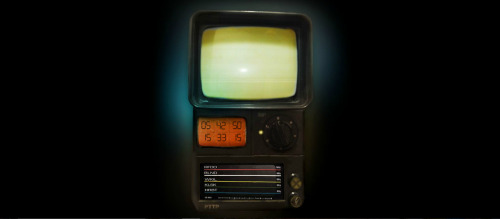
But was the scrapped album hidden away, never to be heard again? Not quite.
In 2012, in a blog post on MCR’s website, Frank talked about the feelings of depression that he had faced after The Black Parade. He felt like MCR had done it all, leaving them with nothing left to accomplish. In November 2008, Gerard called him up to talk about the band. As new ideas took shape, they prepared to start recording the album that would eventually be scrapped after months of work.
Frank pointed out that while the band had limited themselves during the recording of this album, the songs weren’t inherently bad–in fact, some of them were among his favorites that the band had produced. As time passed, he developed a greater appreciation for the tracks. And when the band met up and listened to those songs, they decided to release a selection of tracks to the public–two tracks a month for the next five months, for a total of ten.
After all this time, the album finally had a title: Conventional Weapons. Tracks included “Kiss The Ring,” “The World Is Ugly,” “Surrender The Night,” and the fan-favorite “The Light Behind Your Eyes.” Listening to the tracks, it was clear that MCR had aimed for a rock album with a pure American sound–no ambitious concepts or storylines, just a set of killer tracks. Whether they succeeded is up to the listener to decide, but they provided some insight into what came before Danger Days.
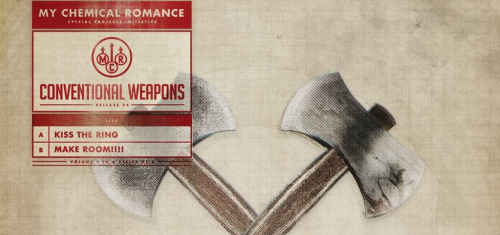
Due to its unconventional release, and the fact that the album was a series of random tracks and not a finished product, Conventional Weapons is not considered an “official” MCR album. But while Danger Days was the final album, Conventional Weapons was the final release before MCR broke up in 2013. Since the split, the release of CW has caused many fans to wonder–will My Chemical Romance’s fifth (and unreleased) album ever be shared in a similar fashion? Or will it be locked away forever, like the other CW tracks that were never released?
Only time will tell. But for now, Conventional Weapons serves as an intriguing part of MCR’s history–a time when the band set out to make one type of album, and ended up making the complete opposite.
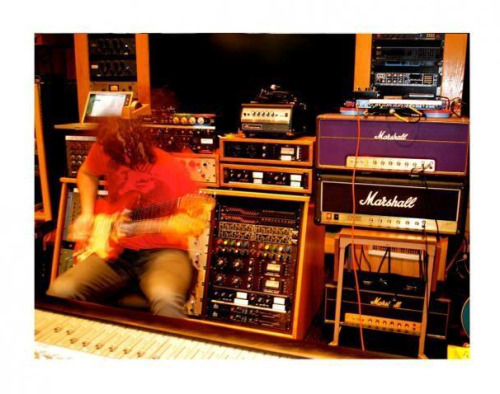
(Picture credits: 1 2 3. Other in-studio photos by Frank Iero.)
[Originally published 07.09.2017]
#my chemical romance#mcr#gerard way#mikey way#ray toro#frank iero#conventional weapons#articles#music#behind the scenes#na na na#bulletproof heart#party poison (song)#killjoyhistory#reuploads
14 notes
·
View notes
Text
My Chemical Romance – The Black Parade
Let me preface this My Chemical Romance retrospective by stating that they are my favorite band, and I still hold The Black Parade as one of my top-5 favorite albums ever recorded. Throughout My Chemical Romance’s career, I was astounded by their rise to fame, and having seen them go as the first opening band on tour with The Used, to headlining stadiums by the time The Black Parade reached its heights, and I have marveled at the lore and theatrics surrounding my favorite artist. The Black Parade was always an album that I kept coming back to when it first came out on October 24, 2006, and it still hits me hard every time I revisit this modern classic. Boiling down to the story of a cancer patient to the closing lyrics of “I am not afraid to keep on living,” I am bold enough to say that I found this album to be perfect from first listen, to now today as I re-listen to it again. In a lot of ways, My Chemical Romance were on a collision course for making this classic album as front-man Gerard Way mentioned in several interviews that he was always planning on make this LP from the start of the incarnation of the band. In some ways, this album killed My Chemical Romance as they put every drop of blood and sweat into creating this record, and even the group themselves initially saw this as the closing chapter to the band. However, what came after the mammoth success of The Black Parade was a scrapped album (to later be released, called Conventional Weapons) to the reinvention of the artist as the Killjoys on Danger Days, to the last recording we were left with on an aborted project called “Fake Your Death.” These events only added to allure and mystique surrounding The Black Parade. From the opening notes of a hospital machine quietly beeping to a flat-line on the introductory track “The End,” everything just seemed to be fully thought out and worked with the vision of this extraordinary group of musicians. When Way sings, “Now come one, come all to this tragic affair/Wipe off that makeup, what’s in is despair,” you are immediately transported to a world inside the five of the bandmates’ heads of a cancer patient living out their last moments. “Dead!” follows this track with an extremely up-tempo pace and rocks like The Ramones on steroids. On the chorus, Way sings, “Have you heard the news that you’re dead?/No one ever had much nice to say/I think they never liked you anyway/Oh, take me from the hospital bed/Wouldn’t it be grand? It ain’t exactly what you planned./And wouldn’t it be great if we were dead?” and it’s almost as if he is finding the silver lining in a life ending to a terrible disease such as cancer. The dual-guitar work of Ray Toro and Frank Iero is at its most potent on songs such as this one, and bassist Mikey Way keeps up with the duo as mentioned above’s frenetic pace. The underrated musician in all of this work of art is the drumming of Bob Bryar, who was let go shortly after the touring cycle wrapped on this record. Bryar’s fills and energy throughout the disc is nothing short of remarkable, and he adds an intricate layer to the story of the record. The next song, is arguably one of the best songs MCR had ever written in “This Is How I Disappear.” From its double-edged sword guitar attack to the somber lyrics of Way scripting out the journey of The Patient in the story, nothing comes off as cheesy or cabaret. Instead, everything clicks at just the right point and time. My favorite moment, in particular, is the bridge where Way sings, “Can you hear me cry out to you?/Words I thought I’d choke on figure out/I’m really not so with you anymore/I’m just a ghost/So I can’t hurt you anymore.” The simplicity of the lyrics to the complexity of what the guitars were doing made this a truly beautiful musical moment for the group, and solidified my pick as album of the year in 2006. “The Sharpest Lives” is a certified killer cut of a track and features some of the best guitar work of Toro’s and Iero’s career to date. Seeing this song performed live just exploded on the chorus of, “Give me a shot to remember/And you can take all the pain away from me/A kiss and I will surrender/The sharpest lives are the deadliest to lead,” and allowed me to personally gain the courage to sing in my band at a later date. It was the energy that I felt from their songs like this that truly made me understand when fans would claim, “Their music saved my life.” MCR may not have directly “saved” me, but it did give me a shit-ton of confidence to feel like I could take on all doubters if I followed a similar path as my favorite front-man. The album itself hits its crescendo and stride on the first single, “Welcome to the Black Parade.” From the gut-wrenching first notes on a piano to the call-to-arms lyrics of Way gaining every misplaced or forgotten kid to join him in the fictional parade, My Chemical Romance hit this one to the moon and back. After the first few opening lines lead into the punk rock verses of the meat of the song, they quickly bleed into one of the more anthemic choruses of my generation where Way sings, “We’ll carry on, we’ll carry on/And though you’re dead and gone believe me/Your memory will carry on/We’ll carry on/And in my heart I can’t contain it/The anthem won’t explain it.” It’s on brilliant choruses such as this one as to why this band hit such an incredible high with The Black Parade. There was simply going to be no way of containing this band’s popularity with certified smash singles like this one. “I Don’t Love You” reminded me a bit of a brit-pop rock band donned in all black clothing hitting all the right notes and moments on a heartfelt ballad. The music video for this track abandoned much of the marching band garb that the fans had grown accustomed to over this album cycle and delivered a quick re-imagining of what My Chemical Romance could do and become. As I mentioned before, Bob Bryar really gets forgotten as an underrated player in the parade, but his chops are what drives songs such as “House of Wolves.” Way’s shrieking in between the cabaret-esque verses come off as playful and fun and don’t seem forced at all from a front-man with an affinity for stealing the show. However, this track clearly gets Bryar to take over, and several key fills help drive this song home. Next up, the heart-wrenching piano and vocal-driven “Cancer,” which Way mentioned in several interviews as being one of the more important songs on the record, and in the totality of the My Chemical Romance project. The beauty of this track comes from its simplicity and features some of the best vocal delivery in Way’s career. This was a song that I didn’t know that MCR was capable of making at this stage in their career, but damn am I glad that they were able to pull it off. “Mama” sounds like a show-tune drenched in emo lore and despair, and even features Liza Minnelli’s vocals towards the bridge of the song. The song is structured around the story of the character “Mother War” as Way responds to Minelli’s earnest vocals with, “But there’s shit that I’ve done with this fuck of a gun/You would cry out your eyes all along.” All of these elements built into this song would be difficult for the average band to pull off. Lucky for us, My Chemical Romance were not an “average band;” instead they became almost super-human on their landmark LP. “Sleep” starts with some actual recordings of Way describing his night terrors during the recording process of The Black Parade, and is a clever way of introducing a killer song such as this. The crescendos in this particular song are some of the most powerful moments you will find in our scene still today, and you can tell that the band hit several key chords with their performance on this larger than life song. “Teenagers” was one song that I originally thought didn’t belong in the fold of the Black Parade-era since it sounded more like a track that would have fit better on Three Cheers for Sweet Revenge. However, now I can’t even imagine this record without this brilliant single, that features some of the most dangerous lyrical content of Way’s career when he sings, “The boys and girls in the clique/The awful names that they stick/You’re never gonna fit in much, kid/But if you’re troubled and hurt/What you got under your shirt/Will make them pay for the things that they did.” In the days of school shootings making us almost numb, due to the vast number over the past ten years or so, this was a lyrical line that could’ve derailed some of the success that MCR had due to the possible lack of sensitivity to the topic. In fact, the music video release was also delayed due to another senseless tragedy that happened around that time. Yet, My Chemical Romance was able to release this as one of their more popular singles from this record and their catalog in general. The ending of The Black Parade record features a great one-two punch of one of my most cherished My Chem-songs in “Disenchanted” and the blazing “Famous Last Words.” Starting with the former, I was incredibly blown away by the production of Rob Cavallo on this song in particular, since he made this somber track shine in so many unique ways. From the delicate opening to the first major hook of, “It was the roar of the crowd that gave me heartache to sing,” everything is pretty damn near perfect. My favorite moment of this song is the restraint that the entire band is able to showcase, as they could’ve done a huge build-up much like the aforementioned “Mama,” yet knowing that they had already followed that formula, they chose to blaze a new path forward on a larger than life emo power ballad. “Famous Last Words,” on the other hand, is just a free-flowing hard rock single that was destined for prime time right from the get-go. With the closing word of “I am not afraid to keep on living/I am not afraid to walk this world alone/Honey, if you stay I’ll be forgiven/Nothing you can say can stop me going home,” Way almost single-handedly gave all of those kids out there struggling for meaning in their own lives a reason to press on and realize that things do get better. With an ending like that, it’s hard not to get just as excited about listening to this record again from front to back, as MCR intended. This LP will undoubtedly continue to stand the test of time in our scene as one of the most critical records in punk, emo, and rock in general. The Black Parade may be “dead,” but its memory certainly carries on. --- Please consider supporting us so we can keep bringing you stories like this one. ◎ https://chorus.fm/review/retrospective/my-chemical-romance-the-black-parade/
0 notes